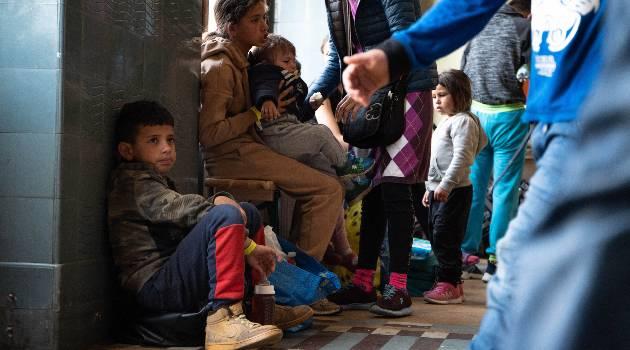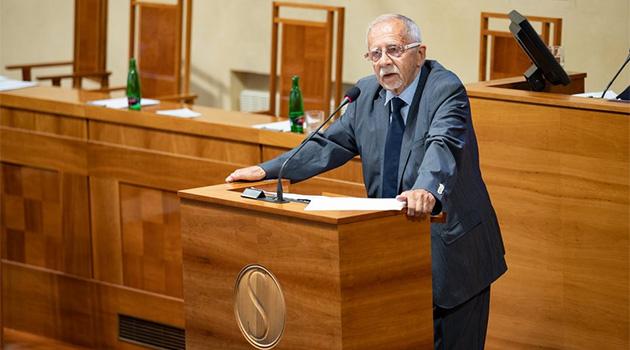Czech ombudsman: Rule changes for temporarily protected Ukrainians leave tens of thousands in precarity, unable to cover their basic needs

Tens of thousands of temporarily protected Ukrainians will find themselves in precarity as of July because of changes to the rules governing the assistance they receive from the Czech state. The Public Defender of Rights (the ombudsman) Stanislav Křeček has warned of the potential impact.
After 1 July, the state will cover the accommodation costs of vulnerable persons only, defined as mothers caring for children up to age 6, children and youth up to age 18, senior citizens (age 65 and older) or persons living with disabilities and invalids as well as their caregivers. Everybody else will have to cover their own accommodation costs themselves and pay market rents.
The value of the humanitarian benefit dispersed to temporarily protected Ukrainians will also be reduced. According to the ombudsman, many temporarily protected Ukrainians will not be able to cover their basic needs as a result, such as food and housing.
Křeček said the resulting circumstance is socially unacceptable and unsustainable. He warned that exploitation of the temporarily protected Ukrainians may result.
“I am concerned that the measures about to take effect will have unfortunate repercussions for tens of thousands of people who are already in quite serious social situations. Many of those arriving here are doing their best but are unable to earn enough to cover their basic necessities. There should be a support system here for them, just as there is for Czech citizens, to aid them with making it through this adverse time in their lives,” he posted to the website of the Office of the Public Defender of Rights.
According to the ombudsman, problems could be prevented by allowing temporarily protected persons into the Czech welfare system in time, just as the state allows after one year of residency for other foreign nationals with different kinds of authorization to stay. He said the Labor and Social Affairs Minister, given the impact of such a decision on the budget and on the already overburdened Labor Offices which deal with welfare, is not even considering it.
“While I comprehend the minister’s concerns, I believe we are about to create serious social and economic problems for ourselves,” the ombudsman said. After the amendments take effect, the humanitarian benefit will be reduced from CZK 4860 [EUR 205] per month to CZK 3130 [EUR 132] for temporarily protected adults who have been residing in the Czech Republic more than 150 days.

(PHOTO: Senate of the Parliament of the Czech Republic)
Financial support to cover housing costs will be a new welfare benefit for such persons as of 1 July. They will receive either CZK 3000 [EUR 127] per person per month if they reside in a housing unit registered with the Labor and Social Affairs Ministry, or CZK 2400 [EUR 101] per person per month if they reside in properties not registered with the ministry.
“In many cases those amounts of money will not be enough to cover dignified housing. Unfortunately, that even goes for those who work. According to recent surveys, most of those who have arrived here have been working for less than CZK 150 [EUR 6] per hour,” the ombudsman said.
As of 1 July, tens of thousands of people will also have to negotiate the cost of their housing with their landlords. Their entitlement to housing paid for by the state will expire 150 days after the date on which they were granted temporary protection.
If the temporarily protected Ukrainians are unable to renegotiate their rents with those operating their accommodation, they will have to find housing elsewhere. The exception will be persons newly-arriving from Ukraine and other vulnerable persons, such as those living with disabilities and their caregivers, minors, pregnant women, students up to age 26, senior citizens 65 and older, and those caring for children up to age 6.
The ombudsman says it will be problematic for most temporarily protected persons to afford market rates for housing. Up to now an accommodater received CZK 350 [EUR 15] per temporarily protected person per night from the state, which could be as much as CZK 10,850 [EUR 460] per month.
Most of those people will not be able to afford that on their own and will have to move out of their current housing, according to Křeček. While they may have family members who qualify as vulnerable, such people will either be unable to live independently or will not want to, which means they will be moving together with the non-vulnerable family members in any event.
This means many vulnerable people may also end up in acute need of housing as well. “That fact increases the risk that entire families will become victims of exploitation. If those in a desperate situation accept offers of unofficial [unregistered] accommodation and ‘pay it off’ through their own labor, that’s all it takes,” the ombudsman said.